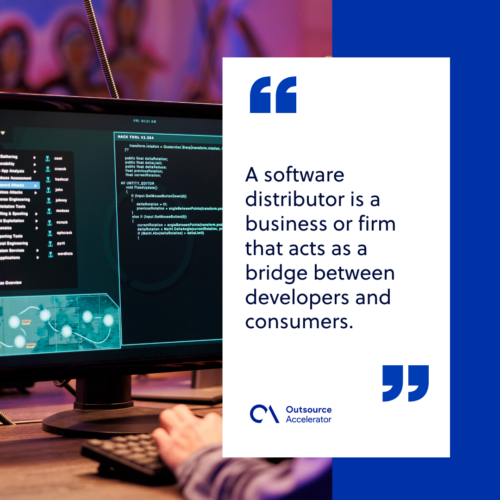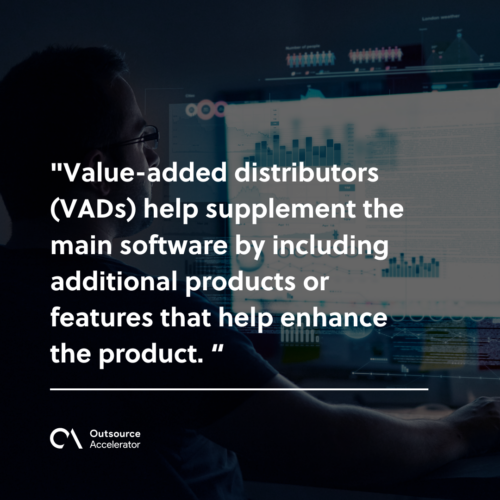Exploring the role of a software distributor

Part of the software development process is ensuring the product reaches its audience
the way the developers intended.
This is where the role of the software distributor comes in, as it plays a pivotal role in the entire software development cycle.
This article further explains what the software distributor does and how it affects operations.
What is a software distributor?
A software distributor is a business or firm that acts as a bridge between developers and consumers.
Software distributors ensure that the product lands in the hands of the target audience. They create marketing tactics and various platforms where consumers can purchase the product license.
Additionally, distributors earn a cut for every successful deal they make with clients, which is why they are motivated to make every transaction successful.

Importance of a software distributor in tech
Without a software distributor, the developers’ efforts to create their product would have been for nothing, as there is no way for it to reach the target audience.
Likewise, consumers would have no way to avail of the product since they cannot access it.
Software distributors facilitate the deployment of a product to the market and, eventually, the customer base.
Before releasing the product to the market, they perform quality checks to ensure it is free of bugs and errors before hitting store shelves.
Types of software distributors
Different software distributors are responsible for different functions, depending on what is needed. Some common types of distributors include the following:
SaaS distributors
SaaS distributors mainly specialize in This type of service helps businesses be more flexible and scalable as they have subscription-based software at their disposal.
Apart from software distribution, they are proficient in tailored solutions and upgrades. They are also in charge of providing support and maintenance to the users of SaaS applications.
Software wholesalers
Software wholesalers purchase a bulk of software in one go with the intention of redistributing them at lower costs to smaller-scale enterprises.
These types of distributors are more qualified to handle large amounts of products. The decreased prices allow companies to purchase them in bulk as well.
IT distributors
IT distributors are responsible for hardware and software IT products. Apart from these products, they provide the necessary tech support for them.
They are the technical experts of the software distribution system, which are crucial in understanding how a distributor works on a technological level.
This allows them to do more than standard software distribution as they can cover a wide range of IT solutions.
In connection, tech support companies like Cloudstaff offer technical support teams capable of providing IT distribution services.
Value-added distributors
Value-added distributors (VADs) help supplement the main software by including additional products or features that help enhance the product. These extra features give software companies a chance to reach out to wider audiences.
If an IT distributor specializes in technology services, the value-added distributors help cater to the users themselves by providing tech support solutions.

Manufacturer-direct distributors
In some cases, the software developers and creators serve as the distributors. As the term suggests, the manufacturer directly distributes the product to the end user.
This model is prominent in online and e-commerce platforms, emphasizing manufacturer-consumer relationships.
Responsibilities of a software distributor
The software distributor has many responsibilities that ensure the transaction between buyer and seller goes smoothly.
Customer support
As mentioned earlier, the software distributor acts as the bridge between the developers and consumers, meaning they can provide pre-selling and post-selling support to them.
Part of their job is attending to customer inquiries and addressing technical issues with the software.
Software marketing
The software distributor helps with marketing the software and making sure it reaches its target audience. They do this through proper market research and software deployment.
They also assist with coming up with marketing strategies to promote the product. Part of properly marketing the software even includes creating packaging and customization to fit the customers’ needs.
Sales operations
The distributor helps create sales strategies to get customers to buy the product. This includes coming up with pricing plans, discounts, and analyzing profit margins.
They can sell directly to consumers (direct distribution) or serve as the middleman between the seller and developer (indirect distribution).
Licensing
Part of the software development process is ensuring legal compliance in terms of licensing.
The software distributor helps out in this area by acquiring necessary licenses and permits and checking if the software abides by legal requirements.
Choosing the best software distributor
Choosing a reliable software distributor is key to ensuring the success of your software and the satisfaction of your customers.
Here are some factors to consider before working with a distributor.
- Terms and conditions – Ensure your terms and conditions align with your distributor, including contract length, clauses for termination, and other agreements.

- Budget – Analyze your finances and how much you can afford to invest in software distribution.
- Marketing expertise – You want to work with distributors with a wide expertise in your field and market.
- Distribution channels – Check if your distributor’s channels align with your target audience.
- Track record of success – It is ideal to work with experienced distributors who have shown success in the past.







 Independent
Independent




